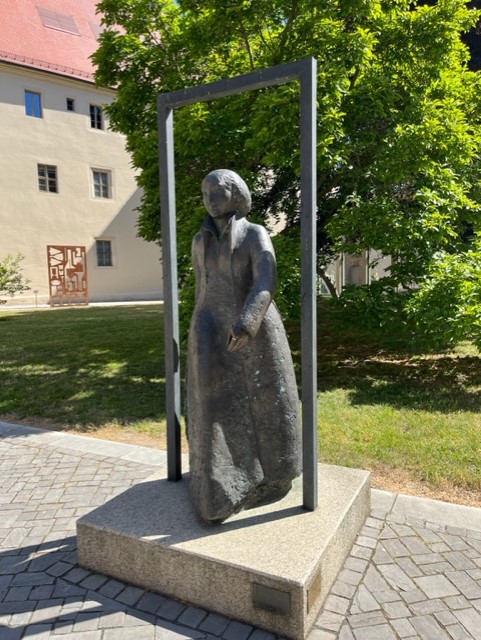Tonight, Jo Ann and I worshipped at Town Church. We celebrated Holy Trinity with people from Boston Massachusettes, Naples Florida, Concordia Missouri, and natives from Germany and Wittenberg area. God's Word was publicly preached from the ornate pulpit located to the side of where the congregation sits in the sanctuary. Did I mention, I was the preacher. Worshippers were asked to remain seated for the postlude which is a common practice among the Lutheran Churches in Germany, a practice we are trying to encourage at Zion. Every service here in Wittenberg ends with the singing of Luther's famous hymn, "A Mighty Fortress Is Our God."
During supper tonight, we were blessed with some historical information that was shared with us by a lifetime resident of Wittenberg. He shared how Germany has become a primarily agnostic state with very few confessing Christians. He discovered recently that he was related to the famous painters in Wittenberg by the name of Lucas Cranach the elder and Lucas Cranach the younger. Cranach the elder was the Electors of Saxony court painter known for his various portraits of Luther and Melanchthon. As a sidebar, our friend went on to share how under Nazi rule every family in Germany had to share their geneology going back many decades to be sure that there were no Jews among their descendants.
Where was Pastor yesterday? Just outside of Wittenberg there is a river with a deep Reformation history. Some say that the Reformation was carried by this river. Luther was known to have traveled the Elbe River some 40 plus times between Wittenberg and Torgau to gather political support to promote the safety and building of Protestant Reformed churches. Wittenberg, with it's new university which was founded in 1502, became known as the intellectual center during the rule of Frederick III (1463-1525), also know as Frederick the Wise, while Torgau established itself at as the undisputed political center in support of the reformation. Believe it or not, in 1526, those in political power in Torgau attempted to organize the first Prosestant Military Alliance. Luther eventually negotiated with Princes and other rulers to allow the Protestant Churches to build in their regions. Military power was not necessary with so many rulers siding with Luther and his teachings.









No comments:
Post a Comment